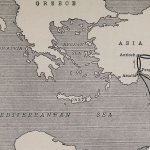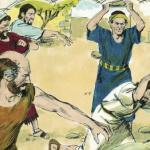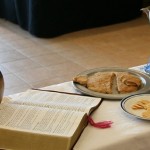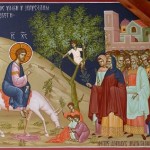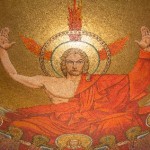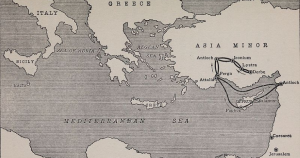 Acts 14:8-18
Acts 14:8-18
“The heavens declare the glory of God, and the firmament shows His handiwork. Day unto day utters speech, and night unto night reveals knowledge. There is no speech nor language where their voice is not heard. Their line has gone out through all the earth, and their words to the end of the world” (Psalm 19:1-4).
The power and the glory of God are manifest in His creation and His work in men’s lives. But often we miss Him. Not in the sense of missing His presence and longing deeply for it but in the sense of simply not seeing Him.
Today, we have ample witness to the existence of God, and to His power and glory. The question is: “Will I see Him?”
Today, Paul healed a lame man. This man was crippled from his mother’s womb and had never walked. But then he heard Paul speaking. Paul, in turn, observed him closely and saw that he had faith to be healed. He says with a loud voice, “Stand up straight on your feet!” And the man leaped and walked.
Luke doesn’t record what this man’s response was, but we can easily imagine that it involved leaping for joy and praising God. This man had seen God in a very dramatic and real way, and from that encounter with God joy and praise most likely came.
The people of Lystra also respond to the presence and work of God, but they get it wrong. Rather than worshiping the true God, who they do not know, they have faith that Paul and Barnabas are really Zeus and Hermes. They even began to bring oxen to prepare for the sacrifice to the gods who had come down to men.
Here we have another reaction, which is to see the work of God but to ascribe it to someone else. This is a very common response to God, and usually we react to God’s presence and work in our lives as if either we or the natural world have done what really was done by God.
We’re really not much better than the ancient Greeks. We’ve cast down Zeus and Hermes from Olympia but have put Mother Earth or Mother Nature there instead. We have our own cultural religion and mythology, and currently our cultural belief is that the world was created and lives by the will of the gods Chance, Time, and Evolution. We have yet to prove that this is how the gods created all that is, but that’s O.K. because the adherents to the Darwinian religion have faith, and a lot of it.
Or we put ourselves on the throne of heaven, believing that by ourselves we have gotten all that we have and done all that we’ve done.
As Paul explains to the Lystrans that they, too, are just men, he also explains another, more common way, that they might see God, and that is through His creation. While God occasionally works miracles so that men believe in Him, He constantly testifies to Himself through His creation. Paul explains that the rain He gives us from heaven and the fruitful seasons are gifts from God and evidences that He exists and Who He Is. The ancient world understood this, even if they ascribed God’s gifts to the wrong gods. As I mentioned earlier, we too ascribe God’s gifts to the wrong gods, only our gods are completely impersonal and uncaring, even more so than the Greek gods.
Following Paul’s logic, we could even go a step further. Since God is the one who fills our hearts with food and gladness (verse 17), we could extend this testimony of God throughout His creation. David saw it in terms of the heavens, the day, and the night. Gerard Manley Hopkins saw God’s presence and glory in His creation this way:
“The world is charged with the grandeur of God.
It will flame out, like shining from shook foil;
It gathers to a greatness, like the ooze of oil Crushed.
Why do men then now not reck his rod?”
But what if you applied this principle of seeing God to every thing in this world that brings you gladness? What an incredible, daily, witness to God and His work in your life you’d have! This is exactly what we should be doing. It is what I call a sacramental worldview, in which God’s creation becomes the means by which we experience Him and receive His blessing. If a sacrament is an outward and visible sign of an inward and spiritual grace given to us, then the entire creation is one humongous sacrament of God.
Everyone would agree that if God healed someone instantaneously today in a miraculous way that we should acknowledge that it was God who did it, our hearts should be glad, and our spirits should be filled. Furthermore, we should immediately want to sacrifice to such a God, just as the Lystrans did, only the sacrifice we should want to give is the sacrifice of praise and thanksgiving.
Why should this impulse to worship God when He reveals Himself and gives Himself to us change when the way He chooses to give us is the ordinary instead of the miraculous? The answer is that there is absolutely no good reason. The real reason is that it is much harder to see God and get excited about His presence in the ordinary things. And yet this is the main way He comes to us, isn’t it? True miracles are very rare indeed. The miracle of God’s presence among His people gathered for corporate worship is much more frequent, about once a week for most of us.
But God in His creation and working through His Church are daily events and not so much daily events as the very environment in which we live and move and have our being, if only we could see!
When Jesus Christ was on earth, He performed many miracles. Many, that is, compared to the none that most men experience or perform. But even Jesus, even the apostles, worked a very limited number of miracles before a very limited number of people. But in God’s creation, we have His daily presence blessing us: we have rain from heaven and fruitful seasons, filling our hearts with food and gladness. In His Church, through His people, we have the very real presence of Jesus Christ scattered over the whole face of the earth. Through His Body, distributed to each of us every day through the saints in our lives, we have Christ before us. In the bread and wine we have the Body and Blood of Christ!
I remember all the way back to yesterday’s meditation and how I was searching for joy and the Holy Spirit. Well, here they are in the daily bread that God gives me through His creation and through His people.
God has spread out before us each day a great feast, which is Himself. He gives Himself to us through His creation, His Word, and His Church. When David prepared everything for Solomon to build the Temple, he said: “All things come from You, and of Your own we have given You” (1 Chronicles 29:14). David said that he saw with joy God’s people who willingly offered themselves to God (verse 17). And as they sacrificed to the Lord, the people ate and drank before the Lord with great gladness on that day (verse 22).
Here is the secret of seeing God, of seeing His work in your life, and of being filled with joy and the Spirit. Here it is in the life of the early church as recorded by Luke: “So continuing daily with one accord in the temple, and breaking bread from house to house, they ate their food with gladness and simplicity of heart, praising God and having favor with all the people” (Acts 2:46-47).
If we did nothing but genuinely and heartily thank God for the food He gives us every day, we would see Him at least 3 times a day (not counting snacks). If we broke our bread with other Christians, the effect would be multiplied. If we extended our thanks and praise and joy to all of His good gifts, our hearts would be perpetually joyful as we perpetually feasted in the presence of our Lord.
Prayer: Lord, I sing your praise, the whole day through until the night.
Dad’s nets are filled, I have helped him.
We have drawn them in, stamping the rhythm with our feet, the muscles tense.
We have sung your praise.
On the beach, there were our mammies, who bought the blessing out of the nets, out of the nets into their baskets.
They rushed to the market, returned and bought again.
Lord, what a blessing is the sea with fish in plenty.
Lord, that is the story of your grace.
Nets tear, and we succumb because we cannot hold them.
Lord, with your praise we drop off to sleep.
Carry us through the night, make us fresh for the morning.
Hallelujah for the day!
And blessing for the night! (A Ghanian fisherman’s prayer)
Points for Meditation:
- Make a list of God’s daily good gifts for which you should give Him thanks. Place reminders all throughout your house or the different parts of your day!
- Reflect on how much you act as if God’s good gifts either just happen by themselves or are due to what you have done.
Resolution: I resolve to intentionally and heartily give thanks to God each time I put food or drink in my mouth today.
Paul’s 1st Missionary Journey – U.S. Public Domain

